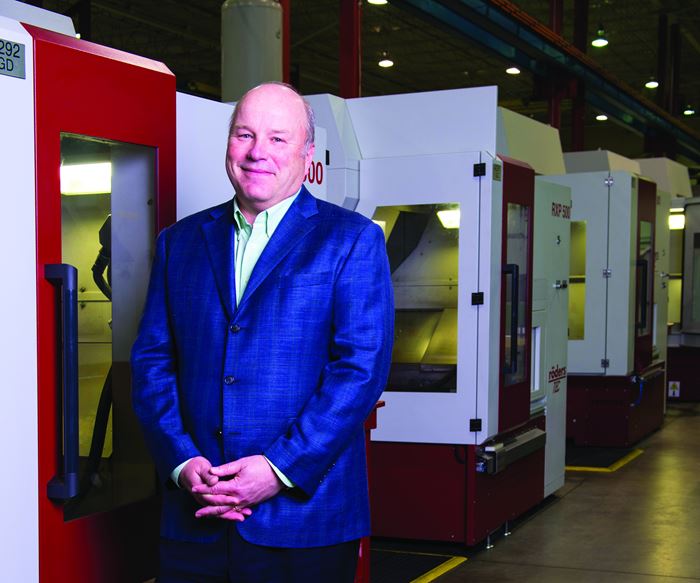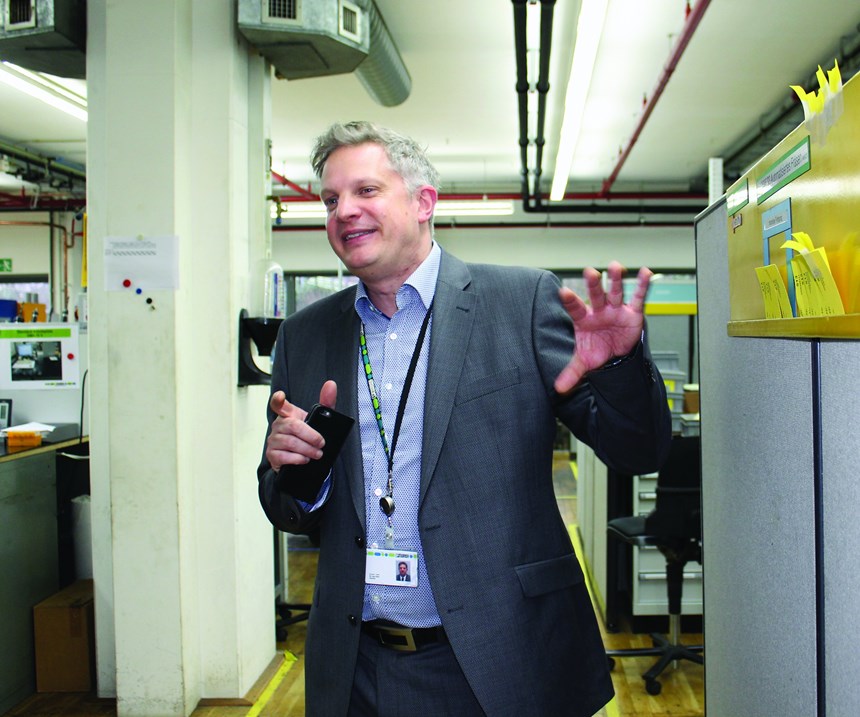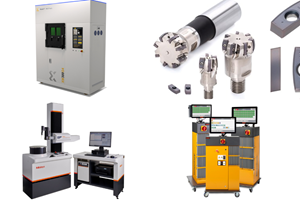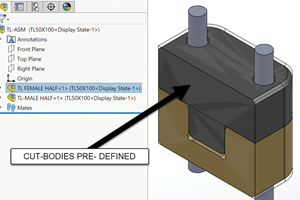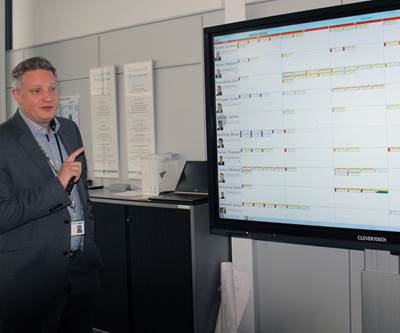Randy Yakimishyn is a big believer in collaboration. The president and CEO of StackTeck (Brampton, Canada), a provider of sophisticated, integrated plastic tooling solutions for the injection molding industry, knows that it is critical to encourage people’s quest to learn, share, collaborate and engage in meaningful ways to stimulate innovative thinking. It helps companies stay globally competitive.
It is critical to encourage people’s quest to learn, share, collaborate and engage in meaningful ways to stimulate innovative thinking. It helps companies stay globally competitive.
“Some reputable mold shops in Europe are very strong, and we have many competitors there,” he says. “We are often compared to the top tier competitors based in Europe. Everyone has to find their own value proposition. What shops in Europe and StackTeck have in common is that our customers aren’t those who make buying decisions based on price. If we share our business challenges and collaborate with other companies, including potential competitors, we can only win. StackTeck leads the industry in many ways, including big sophisticated molds, optimized cycle times and flexible Quick Product Change—however, we’re always looking for a better way to get the job done.”
Yakimishyn came across an article about Phoenix Contact (Blomberg, Germany) that was published in MoldMaking Technology in 2017. The piece describes how the Phoenix Contact implemented an in-house, global tool-shop information system that offers transparency across all databases and manufacturing processes. Yakimishyn contacted the company to find out how the fully transparent and flow-optimized production environment helped Phoenix Contact cut lead times in its tool shop by 50 percent.
“We have invested more than $8.5 million in new equipment and automation in 2015 and 2016 to ensure strong support for customers’ new product launches,” Yakimishyn says. “Similar to what I read in the article, we have implemented a new scheduling system to track and manage jobs that come through the manufacturing floor more closely. New machines and robotics add productivity throughout the plant, allowing us to get work done more efficiently and effectively. We are also very lean, conduct Gemba board walks in the morning and have boards on the factory floor to visualize our processes. But to me, it seemed that Phoenix has taken the concept of lean, process visualization and transparency to the ultimate limit, so I decided to visit their shop as soon as possible.”
Scheduling System Takes Visualization to New Heights
Phoenix Contact did not disappoint his expectations. Sven Holsten is head of Phoenix Contact’s tool shop, and he provided a warm welcome for his Canadian visitors and spent half a day showing them around and explaining the scheduling system and all of the processes. The massive touch screens, which can be found all over the factory floor, are not merely a means for the display of information, but are the core of Phoenix Contact’s unique, transparent, automated and lean production system.
The massive touch screens, which can be found all over the factory floor, are not merely a means for the display of information, but are the core of Phoenix Contact’s unique, transparent, automated and lean production system.
“For us, ‘scheduling system’ means downloading the current work schedule once a week. We monitor all the work in all work areas to identify constraints and conduct meetings at five different plant floor locations every morning for five to 10 minutes. We talk about the plan for the week every day. It works very well for us, but our solution is not as sophisticated as the one we have seen in Blomberg.”
Phoenix Contact developed its scheduling software in-house, including all of the programming. “They are miles ahead as far as scheduling goes with their big touchscreens and how the program works. I wish I could buy that software package right off the shelf. Unfortunately, it’s tailor-made to Phoenix,” Yakimishyn says.
Three of the 180 employees are working full time just to further develop and program the software at Phoenix Contact, and Yakimishyn says that StackTeck is not going to go down that road. “We did a lot of follow-up based on what we saw. There is similar software commercially available through Microsoft or SAP, but even though they offer the same functionality, they are not the same. Those software programs are not laid out as nicely. I guess we have to live with that until we are crazy enough to develop our own dashboard. But, it was great to see that someone is doing it in the way that we envision. We are on the right track, so we will keep going,” he says.
And that is exactly what his company does—it keeps going and growing. With 240 employees and 50 million dollars in annual revenue, StackTeck is a large mold shop. And, as far as packaging and closure molds are concerned, the company ranges among the top shops in the global industry.
Creating the Ultimate Customer Experience
While investment in new equipment, automation and optimum scheduling systems is important to remain competitive, it is essential to understand it is not just about delivering molds on time and making money, Yakimishyn says. “The customer is the reason for everything we do. It is about exceeding customer expectations, working leaner, stronger and more efficiently and building lasting relationships.”
According to Yakimishyn, it is about understanding the customer’s business and providing mold designs that give them a strategic advantage. From product and mold design to complete systems integration, StackTeck develops injection molds and systems to improve companies’ cycle times, featuring the longevity and the quality that the customer expects.
And the efforts pay off. Since 2011, StackTeck’s average yearly sales growth has been 7.5 percent, and the company is now positioned to grow much more rapidly. The company exports about 50 percent of its molds and systems to the United States and the other 50 percent to the rest of the world. “Last year was a fantastic year for orders. We have a strong order backlog and full order books.”
Yakimishyn knows that there are companies that do things better than StackTeck, and there is always room for improvement. So, getting insight into European shops like Phoenix Contact is invaluable to drive his business. In his opinion, Europeans are very disciplined and regimented, which is a competitive advantage in business, and the apprenticeship scheme found in many countries, including Germany, is outstanding.
Yakimishyn is happy that he made the effort to travel to Europe to experience how other companies are organized and how they think and to witness what it takes to be a leader in one’s field. “For me, it was an inspiration. It was nice to see the Phoenix tool shop, and it is reassuring to see another leading company on a similar path.”
About the Author
Barbara Schulz
Barbara Schulz is Gardner Business Media’s European correspondent. She can be reached at bschulz@gardnerweb.com.
Related Content
What Is Scientific Maintenance? Part 1
Part one of this three-part series explains how to create a scientific maintenance plan based on a toolroom’s current data collection and usage.
Read MoreProducts and Services for Multiple Moldmaking Needs
New year, new technology roundup! Featured here is a collection of product offerings, from profile milling cutters to industry-specific CAD/CAM software to innovative hot work tool steels.
Read MorePrecision Meets Innovation at IMTS 2024
After attending IMTS, it's clear that the integration of advanced technologies is ready to enhance precision, efficiency and automation in mold manufacturing processes. It’s a massive event, so here’s a glimpse of what the MMT team experienced firsthand.
Read MoreRead Next
International Perspective: Real-Time Visibility
Phoenix Contact, German Toolmaker of the Year, embraces the concept of Industry 4.0.
Read MoreHow to Use Continuing Education to Remain Competitive in Moldmaking
Continued training helps moldmakers make tooling decisions and properly use the latest cutting tool to efficiently machine high-quality molds.
Read MoreHow to Use Strategic Planning Tools, Data to Manage the Human Side of Business
Q&A with Marion Wells, MMT EAB member and founder of Human Asset Management.
Read More


